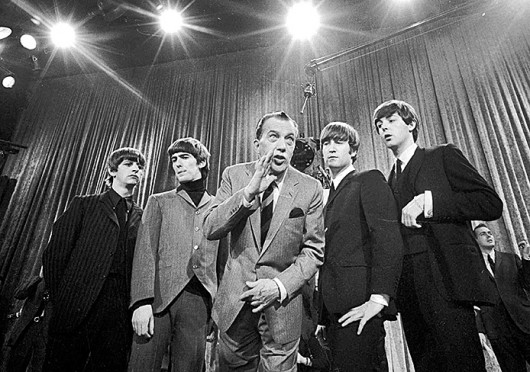
50 years have passed since The Beatles appeared on ‘The Ed Sullivan Show’ in New York City Feb. 9, 1964.
Credit: Courtesy of MCT
“Ladies and Gentlemen, The Beatles!”
Fifty years ago, on Feb. 9, 1964, Ed Sullivan’s now-famous words rang out across the airwaves, only to be immediately drowned out by the piercing, high-pitched screams of the 728 audience members in attendance at CBS Studio 50.
The Beatles’ debut appearance on “The Ed Sullivan Show” was so much more than a performance for several hundred swooning fans in a New York television studio. That night, an estimated 73 million viewers tuned in across the United States to watch the hour-long program, according to The New York Times, shattering the previous record for television viewership.
Years later, in an interview for “The Beatles Anthology,” George Harrison would remark, “We were aware that ‘Ed Sullivan’ was the big one because we got a telegram from Elvis and the Colonel. And I’ve heard that while the show was on there were no reported crimes, or very few. When The Beatles were on ‘Ed Sullivan,’ even the criminals had a rest for 10 minutes.”
As The Fab Four launched into a pulsing rendition of “All My Loving” to open their set, it was clear that the British Invasion — and, more specifically, Beatlemania — had taken America by storm.
The Beatles’ five-song set, which included such timeless hits as “She Loves You” and “I Want To Hold Your Hand,” was filled with numerous quirky and iconic moments.
Memorably, as Paul McCartney sang a cover of “Till There Was You,” a ballad written by Meredith Wilson for the 1957 musical “The Music Man,” the band members were introduced in a succession of close-up shots as their names flashed across the screen. When the camera settled on John Lennon, the caption read: “SORRY GIRLS, HE’S MARRIED.”
Though the dreams of Lennon’s innumerable female admirers were crushed that night, the real dream was only beginning. Over the coming years, The Beatles would change the face of the popular music scene forever.
The performance on “The Ed Sullivan Show” was the catalyst for a cultural phenomenon that is still alive and well today. The band would go on to appear on the program the following two Sundays and by April, Beatles songs occupied each of the top five spots on Billboard’s Hot 100 chart.
With more than 600 million albums sold worldwide, The Beatles are the best-selling band in history. Their level of success was, and is, so extensive that a compilation album titled “1” was released in 2000, comprising the band’s 27 No. 1 singles.
Just a few weeks ago, Ringo Starr and Paul McCartney reunited at the 56th Annual Grammy Awards to perform “Queenie Eye,” a song from McCartney’s recently released album, “New.”
They took the stage again for a CBS special Sunday night, “The Beatles: The Night That Changed America — A Grammy Salute,” surrounded by contemporary A-list performers like Alicia Keys, John Legend and Katy Perry, and the two remaining Beatles reaffirmed their status as hyper-relevant musical icons.
But 50 years ago, as they waited backstage for Ed Sullivan to introduce them to America, John, Paul, George and Ringo were just four young lads from Liverpool, unaware they were on the verge of inciting a pop culture revolution. Imagine that.


